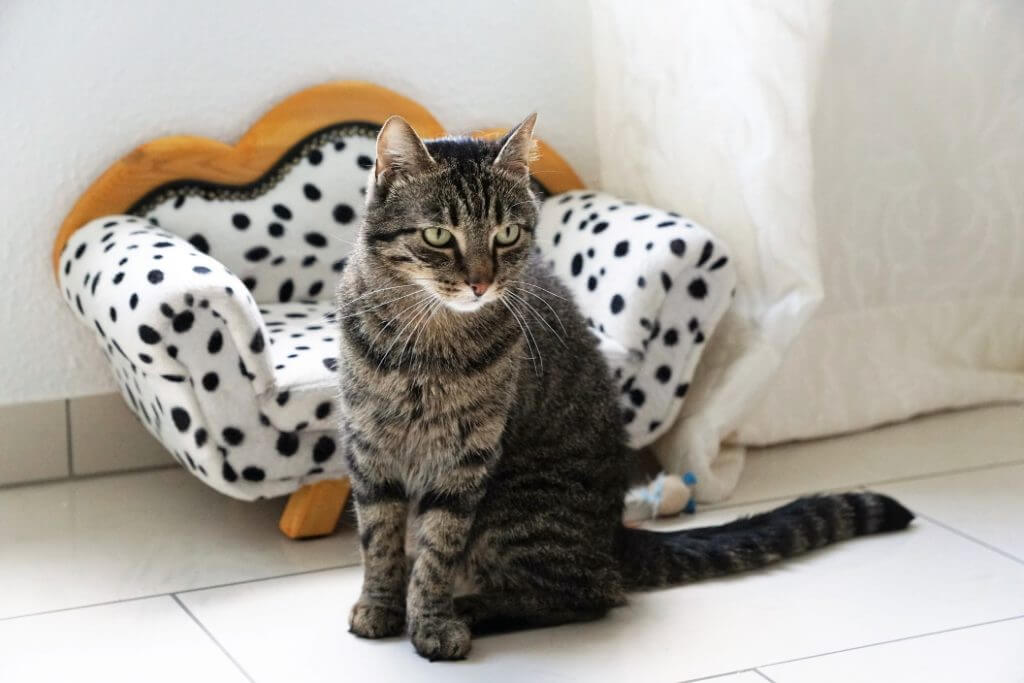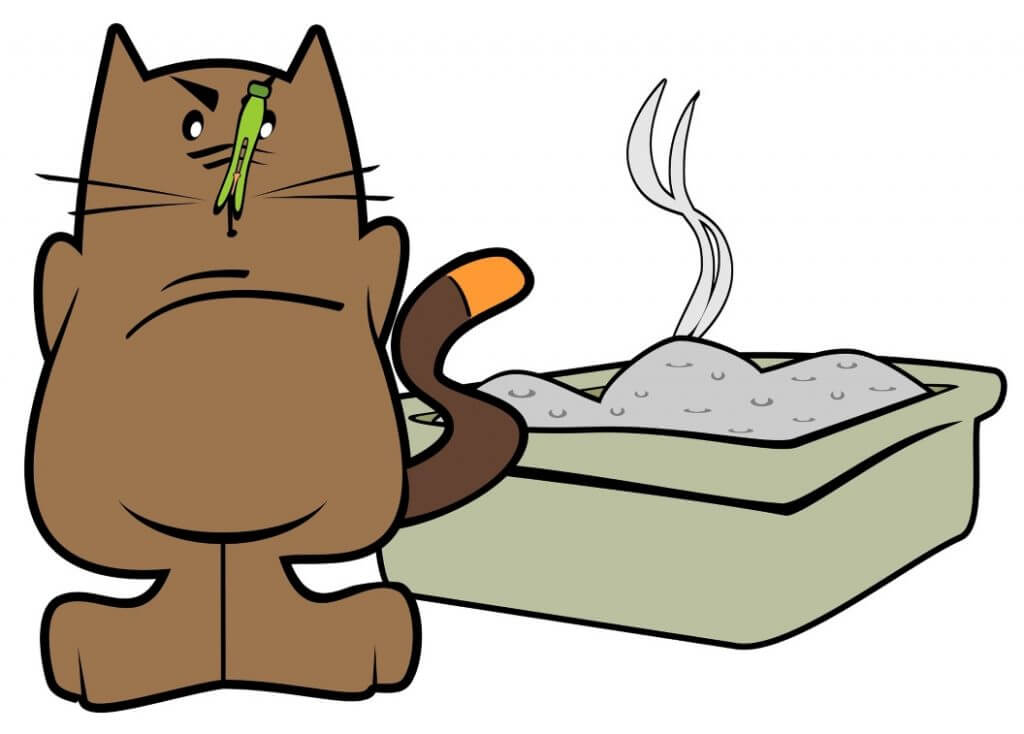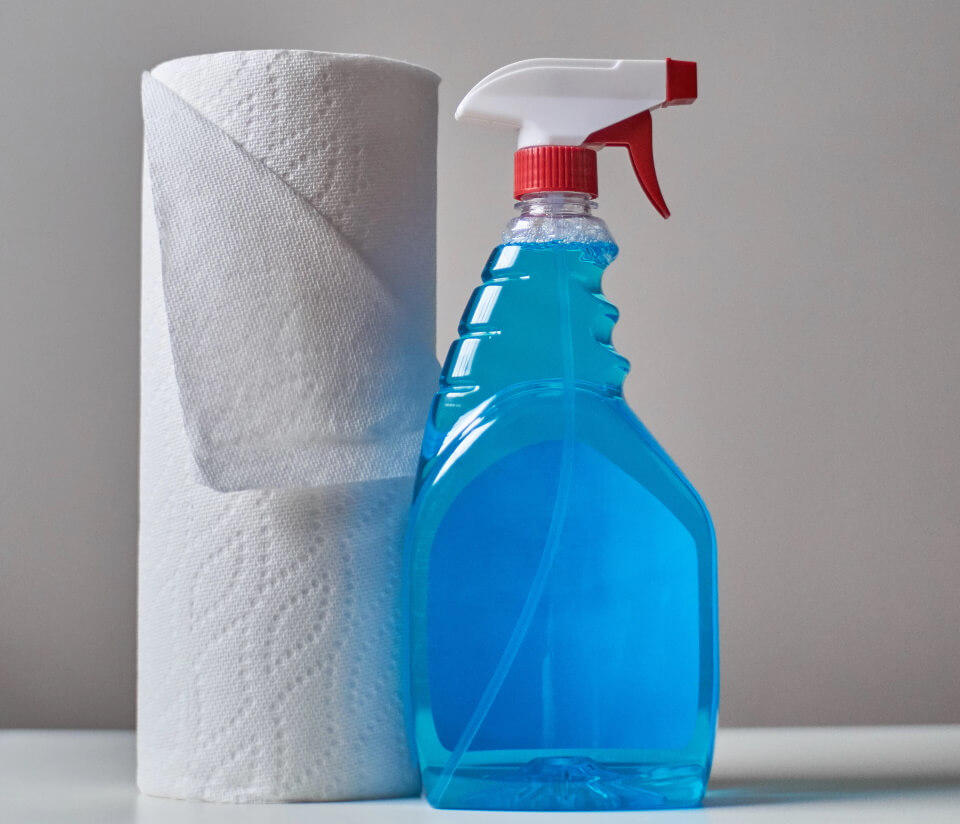This post may contain affiliate links. You can view our affiliate disclosure here.

You love and spoil your cat and give it treats. Sometimes, you think you’re feeding it better than you feed yourself.
This is common. As cat owners, we tend to pamper our feline companions.
But, then one day it happens: as you’re climbing into bed for the night, you notice that your beloved cat has peed on your bed.
At first you may wonder what you did wrong. What could you have done to set your cat off to the point that it has unleashed a urine attack on your duvet?
Rest assured, you’re not alone. Many cat owners have experienced the dread of climbing into bed with cat pee.
While there are many reasons that could explain why your cat has suddenly chosen your bed over the litter box, spite is not one of them.
In this article, we’ll go over the reasons why your cat may have started peeing on your bed and what you can do to solve the problem, so Kitty will go back to using the litter box.
Is your cat sick?

You may assume that this new behavior is a behavioral problem, but that isn’t always the case.
There are several health-related issues that can lead a cat to begin avoiding its litter box. The most common of these are diseases and bladder and urinary tract infections (UTI).
Cats don’t have the ability to associate pain with a medical problem; instead, they associate pain or stress with their surroundings.
So, if your cat experiences pain while urinating in its litter box, it will start to associate that pain with the litter box and it won’t want to pee there anymore.
A great first step in solving sudden behavior changes like this is a visit to the vet. Your vet will examine your cat and do a urinalysis to rule out any diseases or infections.
Is there something wrong with the litter box?
This may sound like a silly question. It’s a box filled with cat litter — what could be wrong with it?
A lot, actually. Cats, like most animals, have a much better sense of smell than we do. And there are few things in life more offensive to your cat’s nose than a dirty litter box.

Would you use a toilet that hadn’t been flushed in a few days? Probably not.
Cats are naturally clean animals and the need for a clean bathroom area is deeply rooted in their survival instincts. Cats always eliminate far from where they sleep and bury their waste to hide the odour from predators.
Properly keeping a clean litter box begins by scooping your cat’s litter at least once a day. If you have multiple cats, or use non clumping litter, you will need to scoop it multiple times a day.
You should also deep clean your cat’s litter box on a monthly basis.
Deep cleaning consists of completely emptying the litter box and scrubbing it thoroughly. If you use a non clumping litter, this deep cleaning should be done twice a month.
Have you recently changed cat litter brands?
Some cats are very picky when it comes to their cat litter. They are driven by a strong instinct to eliminate and bury their waste in loose dirt (sand, silt, fresh dirt); in your cat’s case, this material is cat litter.
If you’ve switched brands, it could be that your cat does not like the texture of its new toilet.
Going back to the original brand or finding another one similar to it may solve the problem.
Has your cat outgrown its litter box?

Often times we get our cats as kittens, so we buy them kitten-sized items.
If your cat’s litter box is on the small side, it may be that your cat has outgrown its litter pan and needs more space to do its thing.
This includes hooded litter boxes. If your cat’s litter box has a top over it, try taking it off and see if it makes a difference.
It could be that your cat is just feeling a little claustrophobic in its litter box.
In general, a litter box should be 1.5 times the length of your cat, not including its tail. So, if your cat is 14 inches long from nose to rump, its litter box should be at least 21 inches long.
Covered Litter Boxes
A covered litter box also has a few other flaws. While some cats enjoy the cover, others don’t.
Covered litter boxes limit air flow, which can lead to more intense odors that offend sensitive noses.
If you have multiple cats, a covered litter box also becomes a trap. If a cat is in the litter box, it can easily be ambushed or blocked in by another cat. It doesn’t have an escape route, which will lead to the cat avoiding it.
Do you have enough litter boxes?

If you have multiple cats, you should have at least one more litter box than the number of cats you have, spaced away from each other and preferably in different rooms.
Cats tend to be territorial and are a naturally solitary animal. If you have several cats using the same litter box, your cat may feel “pushed out” of its territory, which will lead it to finding a new place to make its own. If another litter box isn’t available, your cat will just pick a spot.
If your cat has access to multiple levels of your home (1st floor, 2nd floor, basement, etc.) you should have a litter box accessible to it on each floor. This prevents it from getting “lazy” and not bothering to make its way to its litter box.
You can shop for the best litter boxes here.
Is the litter box in a bad area?
Cats don’t usually enjoy a lot of chaos or noise. If the litter box is in a high traffic area of your home, it may be too stressed out by the volume of activity to want to use the litter box.
If the litter box is out in the open, try switching it to a more quiet and secluded area.
Using the bathroom is a time when your cat is at its most vulnerable. It is unable to sufficiently watch its surroundings or defend itself (remember the survival instincts) and it may feel insecure about peeing in plain view of you and, in his mind, other potential predators.
What makes your bed so appealing to your cat?

First of all, it’s no secret that cats like to be up high. The advantage of elevation gives them a sense of safety. Up high they are out of reach of many predators in the wild.
In your home, being up high keeps them out of reach of children, dogs and other cats. A high perch also offers them the best view of their surroundings.
To a cat in a house, your bed is a big, high perch with a lot of escape room. Most beds are also placed against the wall, which eliminates the need for your cat to watch its back while it pees or poops.
On your bed, it can go to the bathroom and keep a lookout. Your bed also meets its bathroom requirements because it is soft and absorbent, and the waste is easily hidden.
Add this to the safety aspects and your bed becomes the perfect bathroom spot.
Emotional Issues
If your cat is having anxiety problems, is stressed out, or is even missing you, it may choose to pee on your bed as a way to comfort itself by doing its thing where it can smell you.
Of the items in our homes, our beds hold most of our scent. On average, we spend 8 hours a day in it.
To your cat, being on your bed is the next best thing to actually being on you. Cats may not be as open about it as a dog would be, but they still associate their owners with safety.
If you think something may be upsetting your cat, look at what has recently changed. Cats are creatures of habit.
Conflicts
Is there a new person or animal in the home that has started sleeping in your bed?

A significant other, a new cat, or a new dog can all lead to your cat deciding your bed is a kitty litter box. Cats are territorial, and as the cat owner, your cat views you as something of its own.
Cats, like other animals, often use urine as the ultimate display of “this belongs to me”.
When your cat is accustomed to only smelling itself, you, and other familiar people, the smell of a new person or strange animal may be all it takes for it to decide to begin marking its territory.
If there’s a new animal in the house, start to spend more time acclimating the animals to each other, and over time, your cat will view this new pet as a family member and not an intruder. Limit the new animal’s access to your bed until the animals are established as house mates.
If there’s a new person in the house, help your cat bond by having this person feed your cat and spend some time each day petting or playing with it.
Reclaiming Your Bed
After you have assessed the litter box situation and possibly taken your cat to the vet, if the problem persists, there are a few more things you can do.
Getting Rid Of The Smell

First of all, just washing your bedding isn’t enough. Even if you can’t smell the urine after washing your bedding, your cat still may.
If it still smells like its bathroom, it will be inclined to use the bathroom there again.
Before washing, pretreat your bedding with a solution designed to break down cat urine. These products can be found in most pet stores and it will ensure your cat no longer thinks your duvet smells like a place to pee.
Texture
If your cat still insists on peeing in your bed, it may be a texture problem.
Your bed is soft and it may find the texture of your bedding to be more appealing than the cat litter. If this is the case, try changing blankets and see if the problem goes away.
You can also keep a shower curtain liner over your bed during the day to deter your cat. Chances are it won’t appreciate the feel of the plastic as much as it does your comforter.
If all else fails, you can just shut your cat out of your room and remove its opportunity. This way, you can go back to sleeping without surprises.
Conclusion
Dealing with a cat that has stopped using its litter box and is peeing on your bed can be confusing and frustrating.
Even if your vet finds no medical reason to explain your cat’s behavior, he or she still may be able to offer assistance.
Don’t be afraid to ask your vet questions and get as much information as you can. Often times, vets have access to more resources than we as pet owners do, and he or she may even be able to recommend local experts that can assist you in dealing with your cat’s behavior and getting it back to peeing in the appropriate areas.
If you don’t have access to veterinarians or local professionals, have a look at the guide mentioned in the section above.
Thanks for reading. Do you have any problems with your cat peeing on the bed? Feel free to share your experiences in the comments below.



